Air
The year is 1984. Michael Jordan, to me the greatest basketball player of all time, is still a rookie, having recently joined the Chicago Bulls as their third overall draft pick, still far from his total of 32,292 points scored in his NBA career.
Yesterday I watched Air, an Amazon Prime movie directed by Ben Affleck and released this week, showing us how Nike executives went after the Jordans to try to turn Michael into their basketball shoes division spokesperson. I had never heard about the movie — until some Brazilian NBA sportscasters talked about it and how it would be release on May, 12. With Dire Straits’ Money for Nothing as the opening tune and many more nice music in the soundtrack, I found the movie plot very interesting.
And Air is not a movie about Michael Jordan. I mean, it’s not his biography. Ben Affleck, by the way, opted for not showing Michael on screen, directly. The director did this out of deference to him, because no one would portray him up to his legend. So it is that actor Damian Delano Young, who plays Michael, barely speaks during the movie, appearing few minutes and always shown from behind. When Michael does appear, it’s through historical footage, that is, using videos from his own games.
So, it is actually a movie about Nike. I didn’t know Nike was the underdog in the basketball shoes industry, I guess much because I’ve always seen Nike as the giant it is nowadays. Back in 1984 it had a very little marketshare, behind Adidas and Converse, the two dominant powers in the market. And Air shows Sonny Vaccaro, a Nike executive working directly with Phil Knight, the company’s co-founder and CEO, pursuing to hire Michael Jordan as a means to flip the industry’s game board — what they get to do, by closing a historical partnership which resulted in the Air Jordan sneakers family.
Now, I’m not a movie critic or a sports expert. But I really enjoyed the movie. It was nice to see how Air Jordans were sneakers customized to Michael Jordan’s feet, maybe the first ones to be made specifically for an athlete — as the movie makes us understand. Until Nike’s move, the athletes signed with Adidas and Converse and used the shoes these companies provided them without custom features.
From a business perspective — and the movie was pure business, it was something fantastic and unprecedented at that time. Along with another unexpected decision, the one of not only offering Michael Jordan a yearly salary of 500,000 dollars, but giving him participation in the sales of the Air Jordans, something that started a new trend, where athletes started to profit from their partnerships with sports companies.
The Jordan brand is perhaps the sneaker market’s most valuable name. When the movie finished, it was possible to understand that Nike targeted earning $3 million dollars in four years. But that figure was far off what really happened — and only in the first year, the shoe was so popular it sold $126 millions. Today, the Air Jordan brand fetches Nike and Michael Jordan $3 million in revenue every 5 hours. That’s amazing, and that’s way the movie makes us understand the beginning of. So, if you have the chance, give the movie a try.
Week 19, 2023
✱ As the result of a badly curated cold, I’ve caught some laryngitis, probably to ensure my week started well. Lots of sneezes and a chronic cough came along as a result. That’s why the doctor said I’ll need to stick to some medication for the next two weeks or so. At least I need no antibiotics this time.
✱ The week also started with feedback time, due to my yearly performance review. I’ve learned quite a lot about how my peers see me professionally and about my strengths and opportunities for improvement. In general, every feedback I received was exciting — and some parts of them made me get even emotional. It’s nice to be working for a company where your leadership cares for you and tries to show you possible paths. Energized with that 👊.
✱ The small, unexpected surprises are the best ones. Last January, when I signed up to become a Matter app patron, they asked me to indicate whether I wanted to receive custom swag from them, which I said I wanted, because I love what they’re doing (otherwise I wouldn’t have chosen to be their patron from the start). It so happens I completely forgot about it until March, when an email from them kindly asked me to confirm my shipping address. I confirmed and forgot about it again — living in Brazil, I know how difficult it is for devs to send swag overseas, what I totally understand. Until an email from FedEx I received Tuesday morning told me a package coming from Matter would be delivered that same day. And it made me very happy to receive a custom, black ceramic mug and some stickers, all of them with Matter’s motto, “Words are my matter”, which also happens to be the name of an essays book from the awesome Ursula K. Le Guin.
✱ For the second week in a row now I'm involved in a mentoring activity. I love being a mentor, because I love teaching as much as I love learning. In this specific activity I'm involved with right now, I'm trying to help a work mate with improving the overall quality of her presentation skills and, so I can do it, I'm using one of my favorite subjects, storytelling, combined with a couple of professional past experiences. And from her feedback so far, it's going great, not to mention the amount of knowledge I'm also acquiring. There's definitely life in mentoring.
✱ 📚📺 After finishing reading The Nurse last week, I've watched the Netflix TV series based on the book. I've taken some notes during my read and intend to post about the book sometime in the future, but I can honestly say the book completely beats the series off. Netflix presented the story in only 4 chapters of about 42 minutes each, and this turned the story into something very shallow and limited, not focusing on the true crime investigation covered by Kristian Corfixen's book. A real shame.
✱ I just have to say how happy I am for Miami Heat. It’s fantastic to see Jimmy Butler and the team come to their Conference Finals again. That was a great way to finish Friday. There are still steps to climb, but I hope to see them repeat their 2006, 2012 and 2013 feats again. I’ll be rooting from as far as Brazil, but I know it counts! 🏀🏀🏀
✱ Talking basketball, I’ve watched AIR, the Amazon Prime 2023 vídeo which tells us a story based on true events, of how Sonny Vaccaro, a salesman for Nike led Phil Knight’s company in the search for that who is the greatest basketball player of NBA’s history: Michael Jordan. The movie was not the greatest, but it was still inspiring and demonstrative of business disruption. And no one could beat Viola Davis acting.
For when you’re feeling emotional
We are all human beings and, as such, emotional beings. Accepting this reality is important, just as much as knowing that a surge of emotions can definitely influence our decisions, acts, and statements. This week, while talking to a friend, he sent me this anonymous saying, which fit like a glove for when we’re feeling emotional. It goes like this:"Never reply when you are angry. Never make a promise when you are happy. Never make a decision when you are sad."
Coincidentally, looking for information about the origins of the saying, I ended up coming across these 3 tips — dubbed the 3R’s for when you’re feeling emotional by the user who mentioned them in Reddit:
- Retreat. Take a step back from the situation, whether that’s physically leaving or mentally retreating.
- Rethink. Is there another way I could look at this situation? Are my emotions proportionate to the situation, or am I making a mountain out of a molehill? How does this situation look from the other/another person’s perspective?
- Respond. Reacting and responding are two different things. Reacting is much more automatic, and it’s when we let our emotions dictate our actions. Responding means that we’re being mindful of our words and actions moving forward.
Certain things must remain human roles
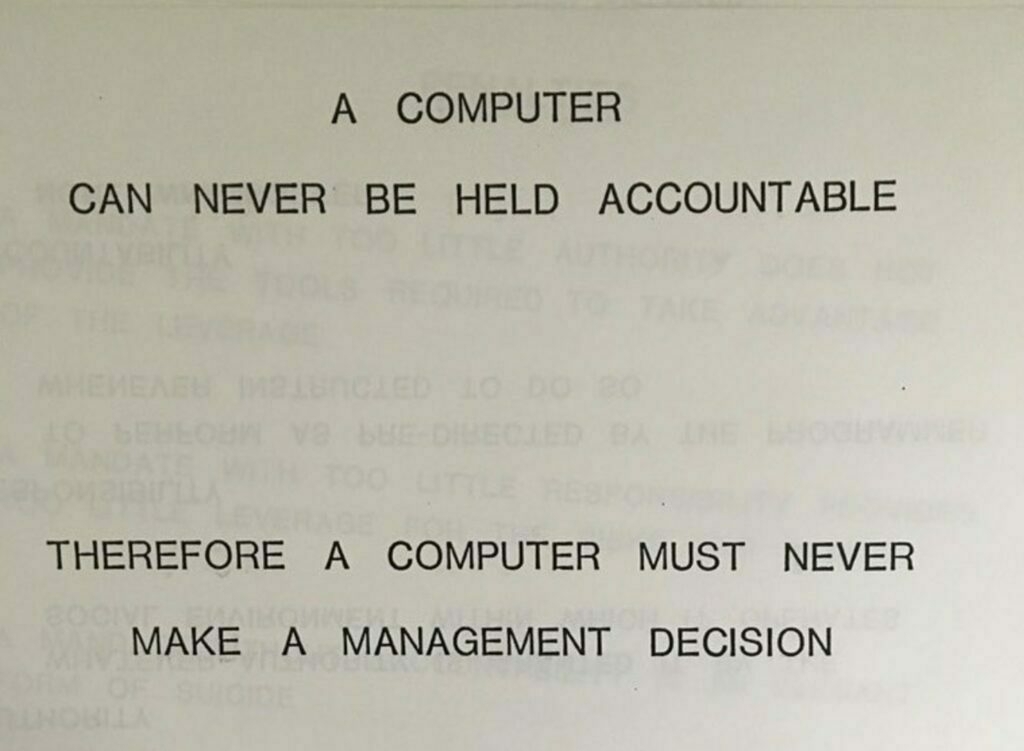
I’ve come across this image while browsing through my RSS feeds this week. Produced in 1979 by someone at IBM — although it’s not clear to me whether it came from an internal meeting presentation slide or a training material, not that this matters —, the sentence the image brings was presented in the context of future technology, both hypothetical and real.
What called my attention and made me think about writing a post was the sentence, “A computer can never be held accountable. Therefore a computer must never make a management decision”. To me, despite being from roughly 40+ years ago, it completely relates, in 2023, with all the artificial intelligence hype, specially when everyone at Sillicon Valley seems to have elected it as a kind of panacea for every humanity problem.
I’ve been meaning to write about it for some time now, so here it goes: I believe that, despite all this hype around AI, all the talk about how it could outperform humans and take our jobs is a big nonsense. Contrary to Geoffrey Hinton, the supposed “godfather of AI”, who, as Paris Marx recently put, believes AI is now very near the point where it becomes more intelligent than humans, “tricking and manipulating us into doing its bidding”, I’d guess that’s something very far from happening at all.
For one thing, AI faces several challenges of its own already, among which the environmental impacts its required processing power may generate, the difficulties and social impacts its algorithms can generate, denying someone credit or by mistakenly taking humans for monkeys. Recent AI has a long road to go down while improving on its own.
Language models, Chat GPT being the most hyped one, although sounding very reasonable while providing their answers, are nothing but parrots in the sense they acquire big amounts of raw data — texts from all over the internet, therefore varying largely in quantity, quality and veracity — and recombine, remix and rewrite them to create a mostly reasonable, human sounding answer. Don’t get me wrong, this is amazing, as it is very difficult to create. But to me it isn’t enough to support the hype that goes by, calling a LLM “intelligent”. LLMs don’t have the ability to think, let alone reach the level of human intelligence as AI currently is. They need training (by humans), need continuous adjusting and refining and yet are susceptible to errors, inconsistencies and hallucinations. And as such, again in my opinion, they’re subject to that sentence in 1979: they cannot be held accountable for what they produce, or say. They are so not intelligent that as soon as an error is made, it takes a human to readjust and rewrite its program so the decisions are corrected from that point on. This means their intelligence will always be as good as the limits of the algorithm.
Finally, there are roles that must remain performed by humans. Last January I was listening to this episode of the Tech Won’t Save Us podcast where Timnit Gebru, CEO of the Distributed AI Research Institute and former co-lead of the Ethical AI research team at Google, talked, among other things, about neural networks:
“For some people, the brain might be an inspiration, but it doesn’t mean that it works similarly to the brain, so some neuroscientists are like: Why are you coming to our conferences saying this thing is like the brain?“
— Timnit Gebru, on neural networks
Neural networks have been inspired by the human brain. By trying to emulate the brain waves and electrical pulses that get in motion when we think and when we make decisions. But they’re not a copy of our brains. Nor work exactly like it. Nor can decide like we decide, no matter how well trained it is. So, there we are again, back in 1979: computers can’t be held accountable.
But imagine for a moment computers could think and artificial intelligences could make decisions. The idea of complex, not transparent, autonomous systems taking care of our finance systems, food supply chains, nuclear power plants and military weapons systems would be horrible. The same if our doctors for example were replaced by robots. The same if out teachers. In all these situations, decisions need to be made by human beings, so the roles must remain with humans. And if that ever changes, in my opinion, it will be the irrevocable sign humanity has lost itself.
Lucky enough, these scenarios are (still) dystopian books scenarios.
Pessoas competentes são artistas talentosos
Você alguma vez na vida já sentiu admiração por alguma das pessoas que trabalha com você? Esta semana tive a oportunidade de trocar alguns pensamentos a respeito disso com um amigo, e a conclusão da conversa foi bastante interessante.
No dia em questão eu tive uma reunião com uma pessoa com quem ambos trabalhamos de forma recorrente. A pessoa em questão já é apelidada por nós de mago das finanças, pois, dentre nós, seus conhecimentos dos processos da área Financeira são os maiores. Nenhuma outra pessoa que trabalha sempre com a gente, aliás, tem experiência exercendo algum cargo na área, exceto ele. E eu sempre fico admirado cada vez que conversamos, porque toda hora que isso acontece, eu — e, ouso dizer, nós — aprendemos um pouquinho mais com ele. “ver uma pessoa extremamente competente fazendo o que ela tem mais habilidade para fazer é como assistir à um músico muito habilidoso dominando seu instrumento favorito”
Quem convive comigo sabe que eu gosto muito dos princípios de lifelong learning, que me incentivam a aprender continuamente, sempre que a oportunidade se apresentar e sobretudo através da troca de vivências e experiências. Não almejo me tornar financista, mas ouvir esta pessoa em particular por vezes me faz pensar que, se eu tentasse, talvez não fosse tão difícil assim. Sempre há algo novo que eu acrescento ao meu parco domínio dos números, e eu juro que um dia serei capaz de usar o Excel apenas com o teclado, tal qual ele faz. Tá, usar o Excel com o teclado com pelo menos 5% da destreza dele.
Depois da reunião, comentei com meu amigo o quanto eu admirava nosso mago financeiro. Admiração pura mesmo, sem qualquer expectativa de algo em troca, sabe? Ainda que eu sempre aprenda alguma coisa, a admiração é maior, e se transforma mesmo em uma espécie de prazer em ver alguém executar o que faz, de forma bem feita, contando com um expertise que apenas quem o possui sabe o que custou construir.
Minha conclusão, compartilhada com meu amigo, foi de que ver uma pessoa extremamente competente fazendo o que ela tem mais habilidade para fazer é como assistir à um músico muito habilidoso dominando seu instrumento favorito.
Ou assistir à um grande chef de cozinha preparando seu prato mais elaborado. Ou ver um grande esportista em um dia inspirado. Ou ter a chance de ler a maior das obras primas do seu escritor favorito. É ter a chance de admirar o talento alheio. Quer você compartilhe ou não o talento em questão.
E a menção à talento, com a qual fecho este texto, não é por acaso. As pessoas extremamente talentosas em suas atividades profissionais são, sim, verdadeiros artistas. E como tais, merecem uma salva de palmas.
Aqui, fica a minha.
Week 18, 2023
✱ There’s this restaurant in our city where my family and me have eaten for I can’t even remember how long now (although I’m sure it’s been for more than 18 years in a row now). We don’t eat there every day, of course, but are regular customers, either eating there, or ordering take out. This week I dropped by them as I usually do, made my regular, favorite, order (the owner knows it well), and when I was about to pay, he told me this time my meal was on the house… and it totally surprised me! When I insisted on paying him, he said that was because of the many years of orders we usually take there. He wouldn’t need to do that at all, but this certainly made me very happy, and added to the reasons for me to go on eating there.
✱ Last Tuesday I could celebrate my first anniversary at the company I’m currently working for, since I came back to work with them again. With this particular anniversary I’ve completed 20½ years of service in total — having left between 2018 and May 2022. I won’t get into specific details here, except to say that I’m proud of working where I work and to say that it feels like being home again. I really hope to remain where I am for many and many years to come 👊
✱ Also on Tuesday I flew to Rio de Janeiro to participate in Rio Websummit 2023. It’s a very big and important technology and innovation event that’s happened in Brazil for the first time this year, and I really enjoyed the opportunity to be able to visit the expositions and to watch some interesting keynotes.
✱ Then, last Thursday, when I landed back in São Paulo, I had the chance to spot one of the four existing Azul Airlines aircraft featuring Disney character paintings. While I was getting off the plane and moving inside the finger to get to the airport building, there it was: the Daisy Duck aircraft. I really liked the chance to spot it, and I posted this picture here as to share the vision with you.
✱ I briefly went out with a friend from work this week for having a coffee, so he could help me with a procedure I was having doubts with. This experience got me thinking about two totally different aspects. First, this is something I should do more often. As someone who can WFH, going out and performing certain tasks on my notebook while sitting at a coffee shop is really interesting and focus helping, if only because it allows you to change the scenario a little bit. Second, my friend introduced me to this coffee shop I didn’t know about, and it features Japanese small food and beverages. So I ended up coming back later with my children, for the older one has studied Japanese language — and culture, for that matter — for at least a couple of years now. The aftermath is that I had two taiyakis, a kind of waffle biscuit, one with my friend and the other as I returned with the kids. And I also tasted matcha green tea, which is very popular but a lot bitter to my own taste. Anyway, the experience was fantastic.
✱ Somedays ago I found out about Netflix’s The Nurse, a true crime miniseries about a Danish nurse who was accused of murdering some of her patients as if she was an angel of death. Now, I like true crime stories and was set to start watching the production, when I discovered the series is based on a book. So I first read the book, and finished it this very same Saturday (so in time to be featured in this weekly notes post). Kristian Corfixen’s book then became my eighth read book in 2023, out of the 20 I’ve set as a goal. I’ve then reached 40% of the way.
It's a human need to be told stories
“And it’s a human need to be told stories. The more we’re governed by idiots and have no control over our destinies, the more we need to tell stories to each other about who we are, why we are, where we come from, and what might be possible.”
— Alan Rickman, 1946-2016
Week 17, 2023
✱ My son had a tomography of his inferior wisdom teeth this week. All because his teeth are in a difficult position to come through, and will need to be extracted while internal. This exam will allow the dentist to define the best strategy to do so. The exam itself is one I had never heard about, a “cone beam” tomography — very advanced and vanguardist, according to his dentist. I hope the results are good and do allow to choose the best course of action.
✱ Anxiety fell hard on me this Monday. Lots of things I’ve still been learning and getting used to professionally were the great culprits. Thank God I have very nice friends who could quickly cheer me up and help me overcome it.
✱ Deciding to use Wordpress for blogging again is something I don’t regret a bit. Nevertheless, I knew the risks I was going to be exposed to, specially my long date mania of never being satisfied with the theme I use for the site. It is true I decided to start with a no-brainer, that is, the Beaumont theme from Anders Noren, who produces very high quality themes for free, but I couldn’t help wanting to change it, even knowing that most Wordpress modern themes are bloated, block-based Gutenberg ones. I even created a discussion thread at Órbita, a Brazilian discussion forum, looking for simple theme suggestions, but it wasn’t until Tuesday, after starting to follow Matthias Pfefferle in Mastodon, that I came across his Autonomie theme, “a highly semantic, responsive, accessible and search engine optimized WordPress Theme”, charged with HTML5 templates, and refined with several microformats, and many OpenWeb plugins. When I saw that it has auto-dark mode according to the user’s local preferences and support for post formats, I was sold. And this is why — until I change my mind again, at least, Autonomie is powering my site.
✱ 🏀 Total NBA week for me, following every playoffs game I can (even though my personal preference is for Miami Heat and Lakers). Honestly I’m rediscovering the joy of watching BB games and I’m loving it. Kudos to Jimmy Butler, by the way, for being a real LEGEND and for taking Heat further down the championship road.
✱ Took my younger son to see the doctor this week because he was coughing lots and lots. Stuffed nose too, and for many days. Needed to start antibiotics, but is doing better now. As my trip to Rio de Janeiro approaches, I took the chance and also saw the doctor, because of a (now properly medicated) sore throat. 🤒 😷
Tiny sci-fi stories
I’m so disappointed that I only came to know about it this week — but, as they say it, better late than never, isn’t it? The thing is, Twitter user small worlds is creating tiny sci-fi stories in 2023, and publishing each one as a single image, one per day.
As someone who enjoys both reading — and, quite once in a while, also writing —, I was immediately drawn to the tiny pieces, both because they are science fiction micro posts, and because they follow the likes of Black Mirror, a satiric British TV series mixing sci-fi and the idea of modern technology, such as AI, running out of control and making humanity dive into obscure, alternative near and quite dystopian futures.
From all the pieces published so far, I’ve selected 10 that, to me, are very interesting, and I’m sharing them in this gallery below:
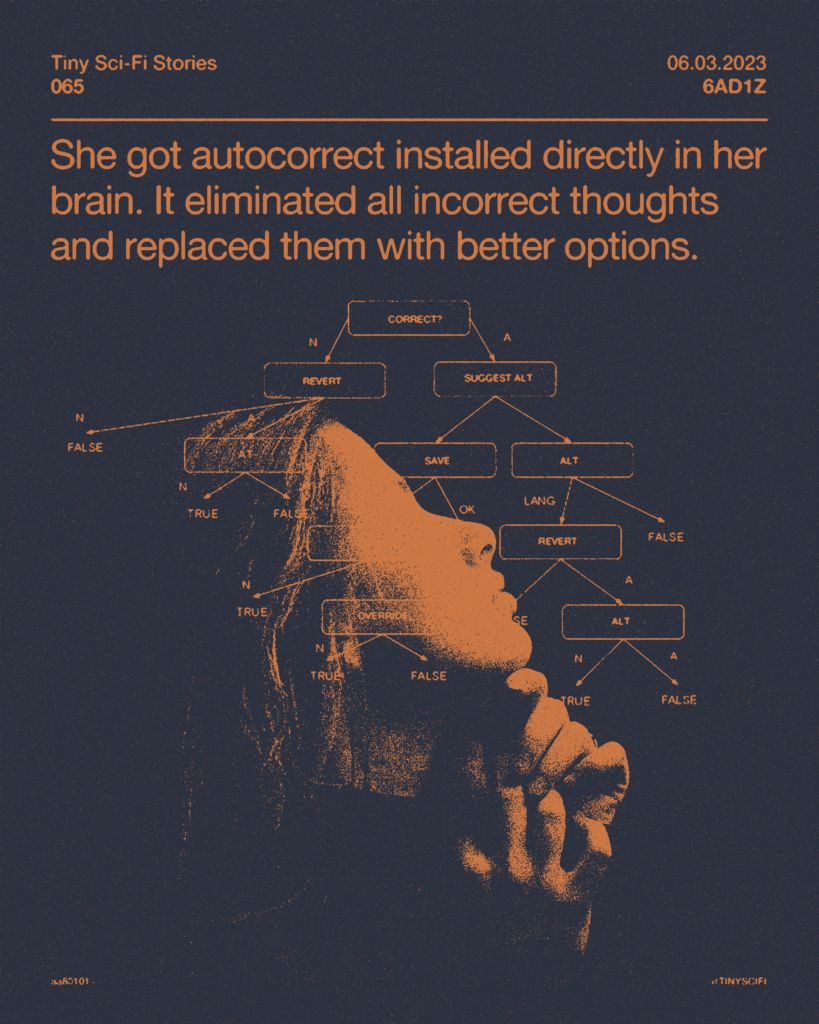
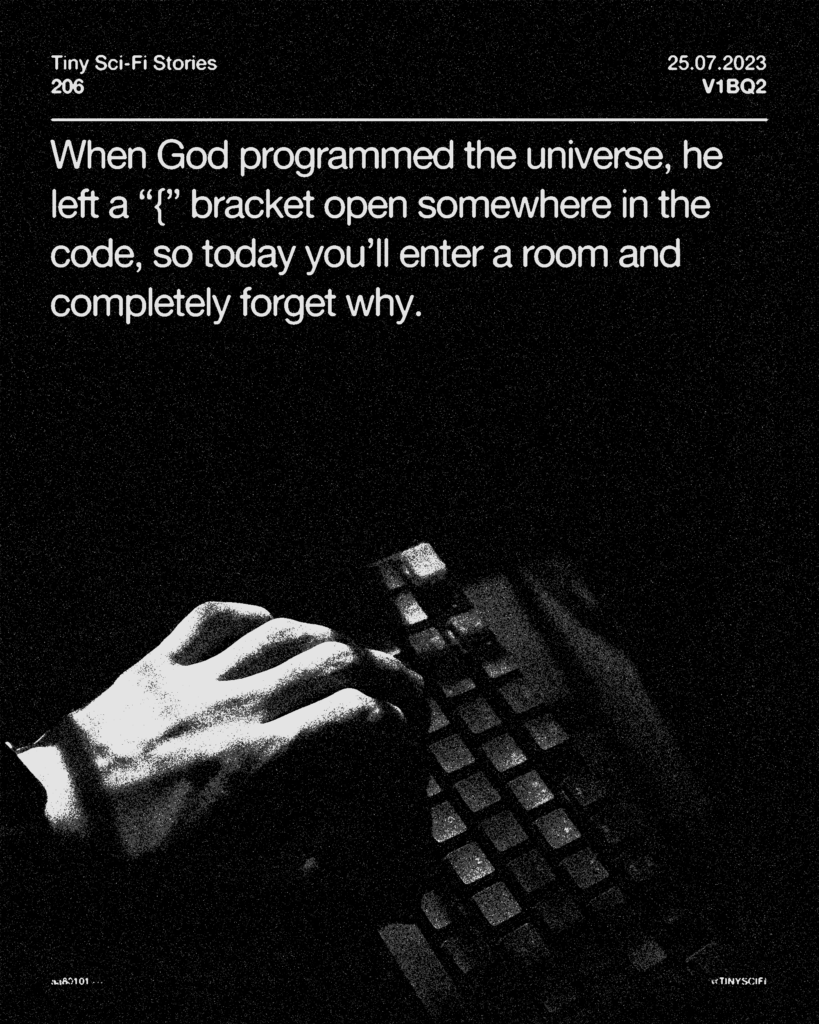
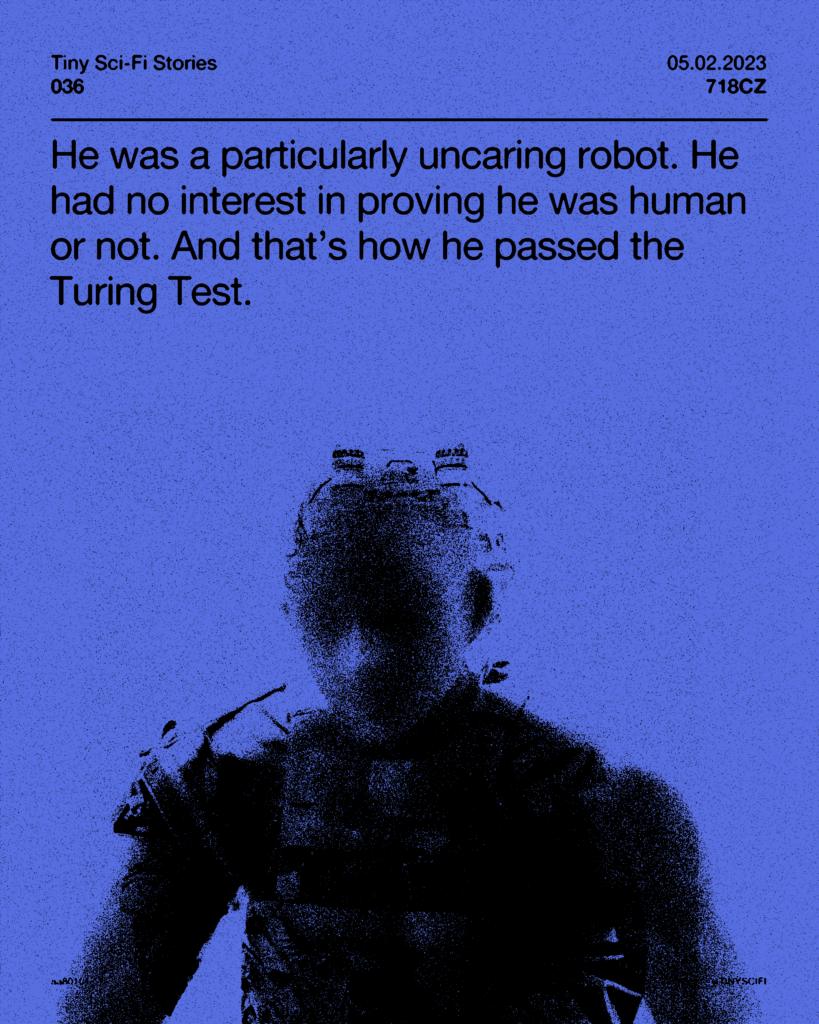
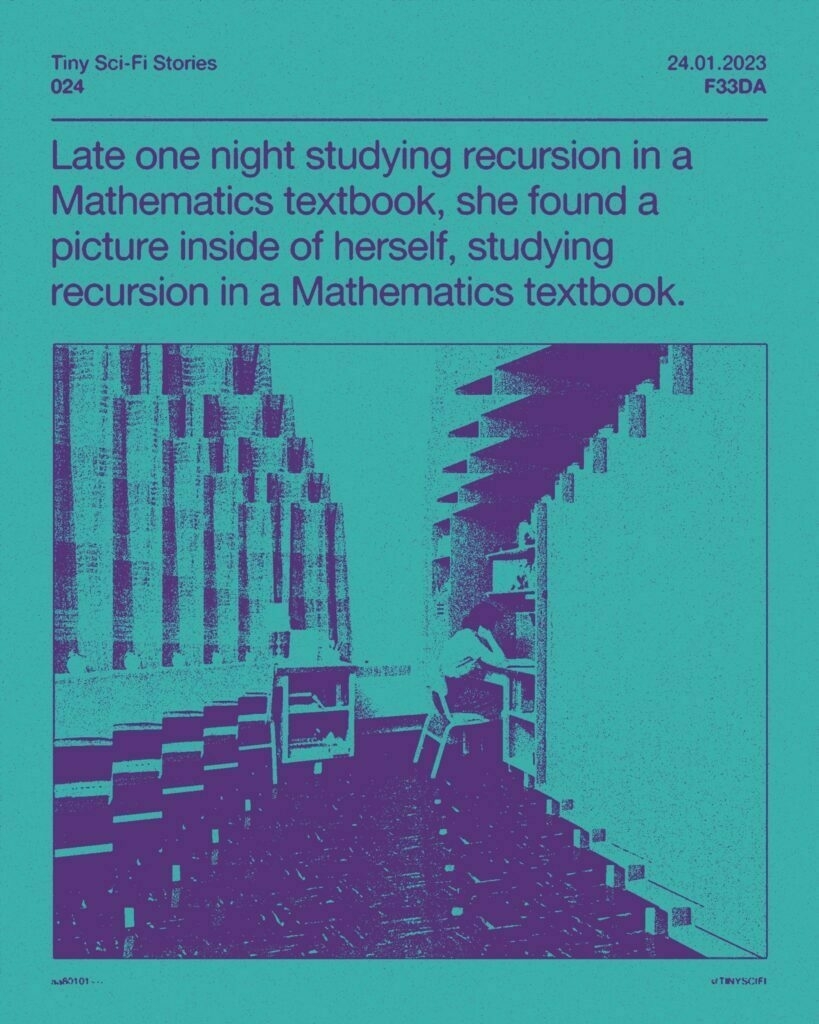
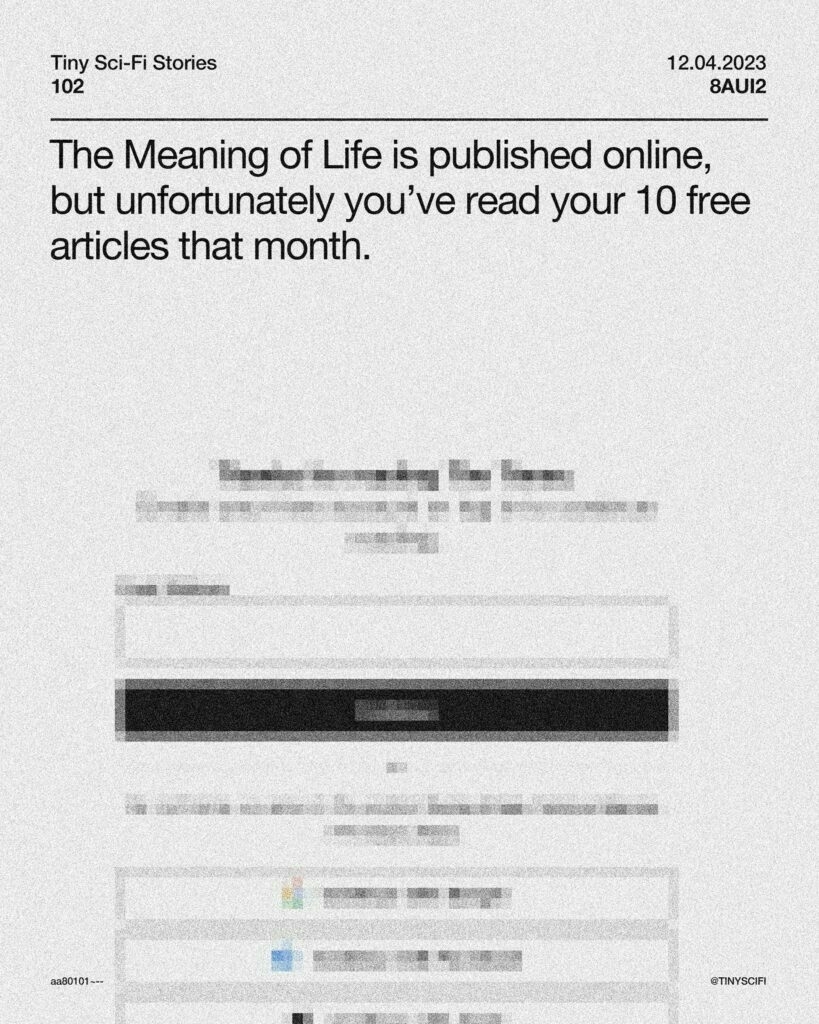

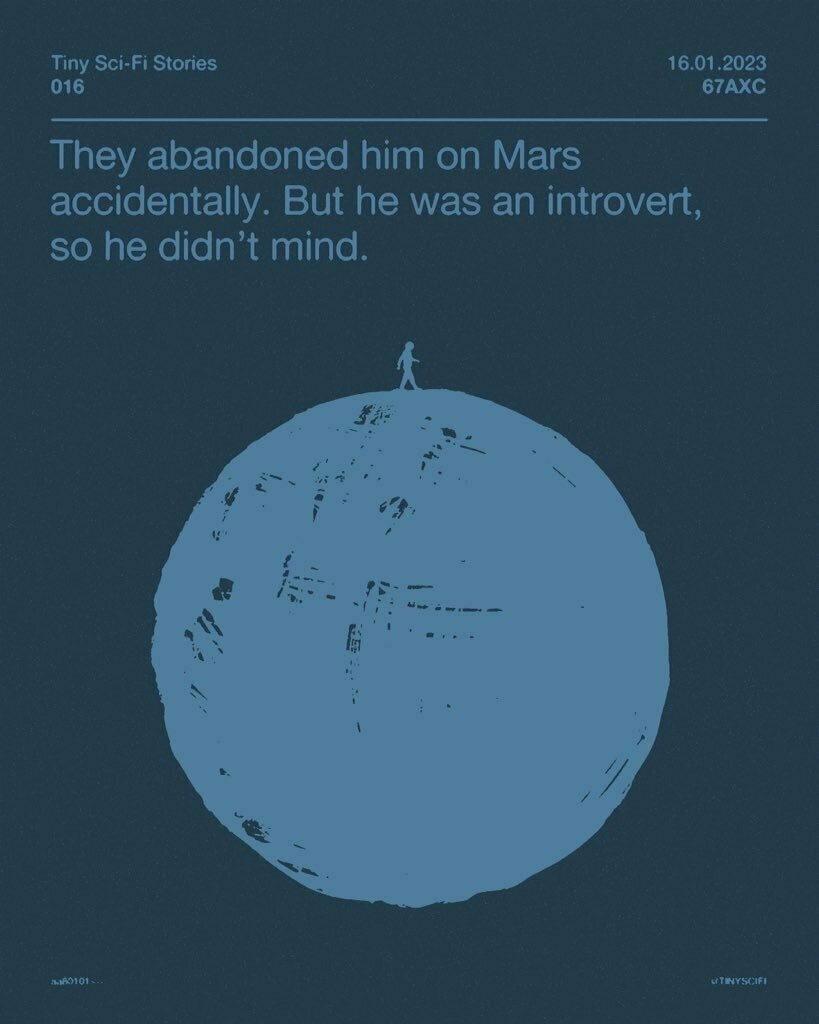
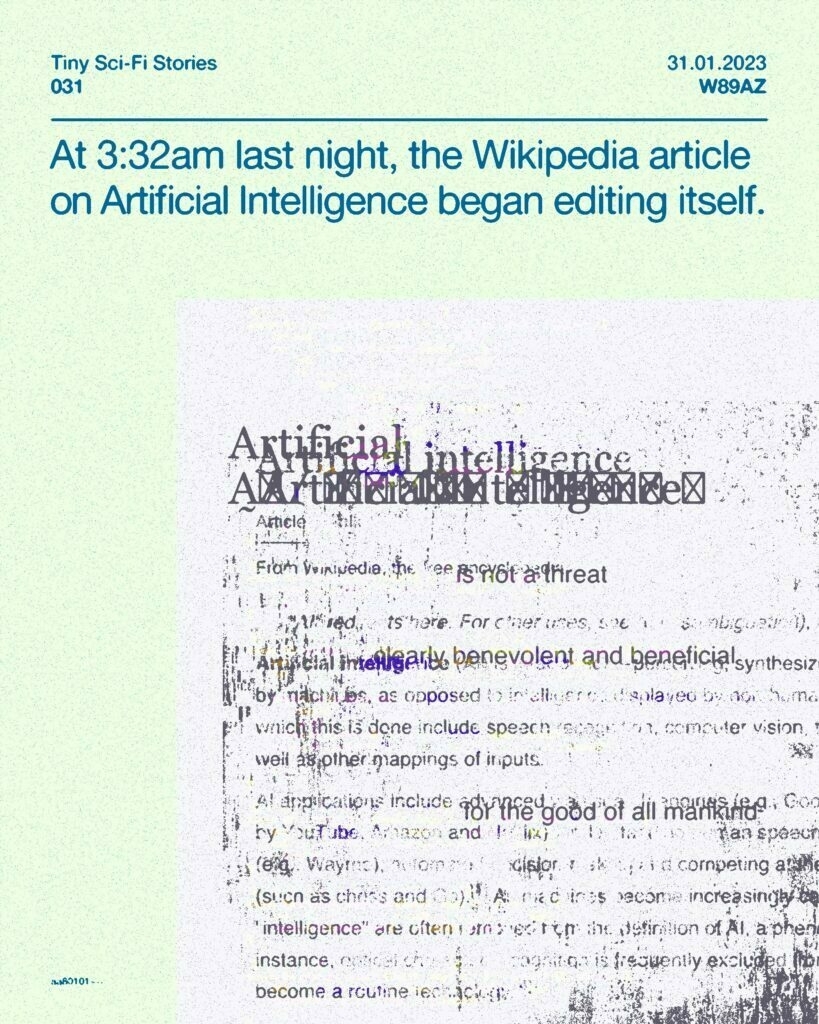
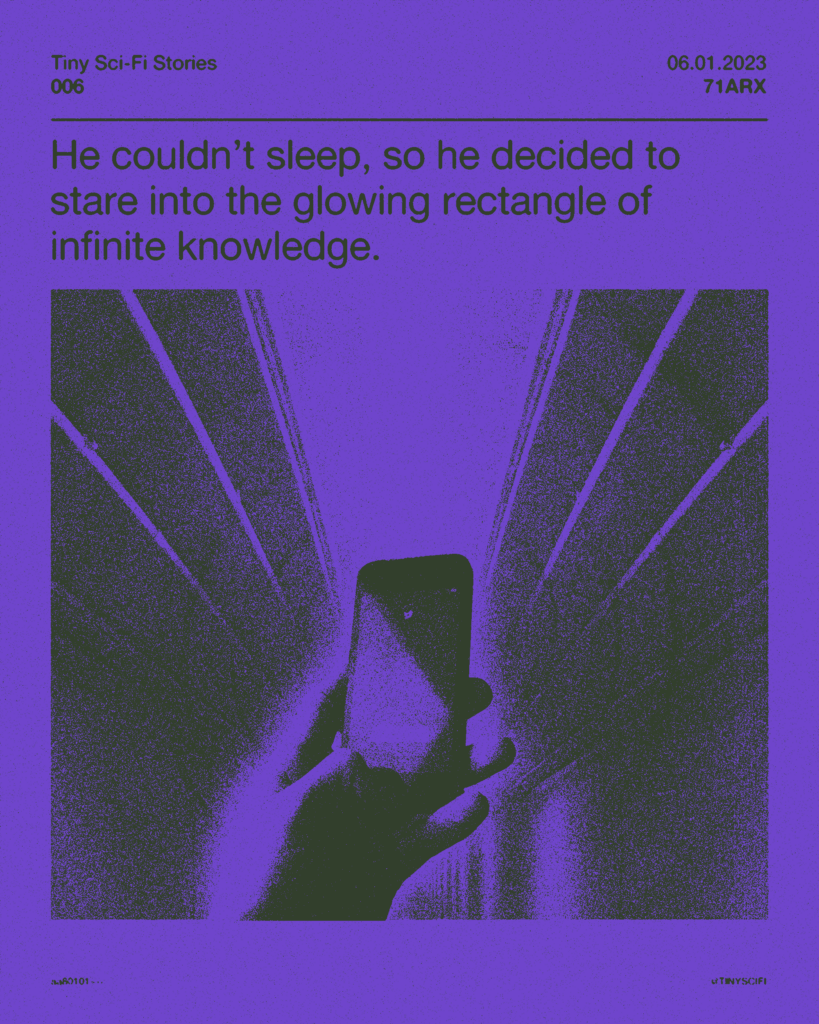
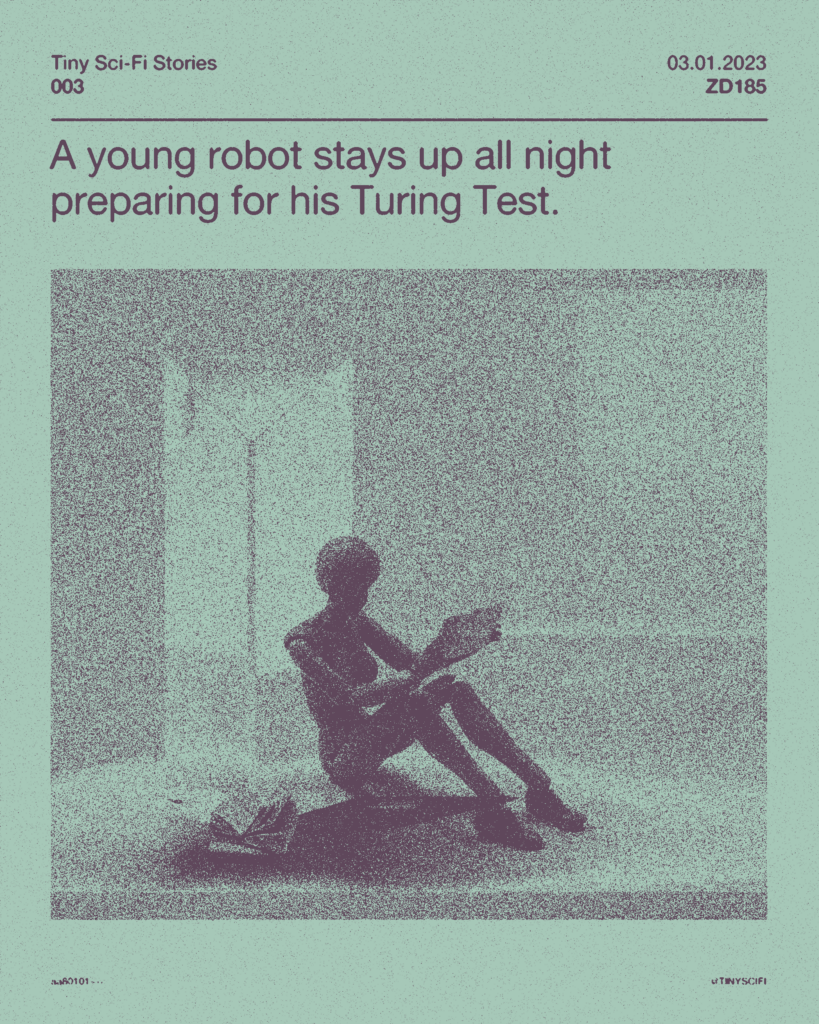
The king and the pawn
“After the game, the King and the pawn go into the same box.”
Old Italian Proverb
Week 16, 2023
✱ So after a long wait, I was finally able to watch the Tetris movie. It took me 15 days longer than I wanted and some connection problems with the Apple TV+ service happening exactly at the same time when I decided to use my free trial, but I got it — and I don’t regret having watched it. Very good movie!
✱ This week I was finally able to finish working on my yearly income tax. In Brazil, all taxes are submitted electronically via internet, and citizens have between March and May to send in their data. Normally, I submit everything in the first weeks of March so I can receive any restitutions earlier, if applicable, but exceptionally because last year I changed jobs, it took me a little longer to gather all the information I needed. The important thing is that, now, all is solved.
✱ I finished reading my seventh book this year. It’s “A Guerra da Papoula”, the Brazilian Portuguese version of The Poppy War, by R.F. Kuang. In general, despite of some ups and downs I enjoyed the story, which presents a nice plot and premise, and is actually distributed in a trilogy, from which this is the first book. With the second book already published here, the publishing house responsible for the Brazilian editions of The Poppy Wars has already declared the third and final installment of the series will be out in the second half of 2023.
✱ It made me really glad to learn, this week, that Desktop Dungeons: Rewind, the sequel I so very much anticipated to Desktop Dungeons, not only was finally released on April, 18th, but also offered free of charge to people like me, who owned the original game. Thus, I didn’t need to spend a nickel and already accumulated a couple of gameplay hours. Fantastic news!
✱ I couldn’t believe when I found out my corporate credit card had been cloned. It had just arrived and the only things I ever did with it before the incident were buying a plane round trip to Rio de Janeiro and booking a hotel there. Only a couple of days later I received a credit card purchase notification through the phone informing me of an unknown, unauthorized purchase. Fraud. I’m about to travel on business and the perspective of traveling without my corporate card really scared me, even more after the bank told me a new card could take up to 15 days to arrive. Card blocked, it was really a relief to receive a new one only 2 days after my contact. This means I’ll be able to properly travel. ☺️
✱ This last Friday, April 21st, was a holiday here in Brazil, when we celebrated Tiradentes’ day. He was the main representative of the Inconfidência Mineira movement, which fought for Brazil’s independence from Portugal. He dedicated himself to pharmaceutical practices and dentistry, earning him his nickname. "Tiradentes" means "tooth puller", a pejorative denomination adopted during the trial against him, after the Inconfidência Mineira movement was dismantled and he was sentenced to death by hanging, in 1792, 30 years before the actual Brazilian independence from Portugal happened, in 1822. History apart, I took this extra day off to rest, read, and watch some TV series. And it was really nice!
The natural size
I’ve come across this little piece of Seth Godin’s wisdom and I’m going to share it here, as it was published by him today:
“No matter how many people come over for dinner, you’re only going to be able to engage with a few.
And no matter how big the crowd in the arena, the musicians can only see the faces of a few hundred.
An investor can only be engaged and smart about a very small number of companies.
And it doesn’t matter how many students are in the class, the teacher is only going to be able to get in sync with a few.
Microphones, network connections and other forms of scale are a miracle, but sooner or later, our brains get in the way.”
— Seth Godin
Thoughts on regulating AI
I found it very interesting to learn that, likely following Italy’s example, Europe as a whole is starting to organize to create some kind of specific legislation to regulate AI.
In my understanding, the main reason authorities have to start thinking about AI regulation doesn’t lie in AI being dangerous or out of control, but in the fact that we, as humans, have a very prolific imagination. And with AI models available to millions of people right now, not requiring anyone to have the slightest technical knowledge to use them, you can imagine what happens. Take, as an example, the guy who used Midjourney to create a fake image of the Pope wearing a white puffy jacket.
Consider also Claudia, a 19 year-old, beautiful and horny woman, also 100% created via AI, the brainchild of two computer science students who decided to create her as a joke, after knowing about the story of a a guy who made $500 catfishing users with photos of real women. And they succeded.
Or take Alexander Hanff’s case as a final example. ChatGPT wrongly stated to Alexander, a renowed computer scientist who happens to be very much alive, that he had passed away in 2019.
These examples, at least to me, all reflect the need to institute some kind of regulation. I just don’t think doing such regulation is going to be that easy. But I’ll come back to that in a moment.
According to a report by the Financial Times published this week, members of the European Parliament intend to create Europe’s Artificial Intelligence Act, a sweeping set of regulations on the use of AI, among which is asking for developers of products such as ChatGPT to declare if copyrighted material is being used to train their AI models, so content creators can demand payment when applicable.
They also want responsibility for misuse of AI programmes to lie with their developers rather than with small business (and persons) using it, what I don’t think it’s a bad idea… but in my opinion, the most interesting obligation the European AI Act may bring to reality is for LLM chatbots to explicitly tell users that they are not humans.
You might think that a language model explicitly telling you that it is not human is unnecessary. But consider all this coverage media is giving to AI recently: it feeds peoples’ imagination, making them believe artificial intelligence LLMs might have abilities and consciousness they don’t actually have. I myself have spent a couple of hours discussing this exact point with my parents a couple of weeks ago, and I can say that it can become very difficult, sometimes, to separate fact and fiction in people’s minds.
The difficult to separate reality from imagination is fueled by the fact that, when people identify that a machine, rather than another human is interacting with them, machine heuristic comes into play, making them believe that machines are accurate, objective, unbiased and infallible, clouding people’s judgment and causing an overconfidence in machines judgement and decision making.
Also on the side of things that just don’t help in convincing other people that AI is not infallible is the behavior of humans, who tend to unconsciously assume competence even when a given technology doesn’t really warrant it and lower their guard while machines perform their tasks.
People also tend to treat computers as social beings even when the machines have only the slightest hint of humanness, as is just the case with language models. We tend to apply the same human-to-human interaction rules to the interactions we make with machines, being more polite, for instance (or have you never typed a Google query in the exact form of a question you’d ask another person, even if the computer algorithm doesn’t really need you to type in that way?). Thus, when computers seem sentient, people tend to trust them, blindly.
So take the great imagination our human brains have and combine it with these behavior biases I’ve talked about, and you have not one, but at least two good reasons wy regulation is needed for AI. Like I said before, though, I don’t think this will be easy, even if Europe and their legislators are trying to take the lead.
I believe AI is different from conventional engineering products. Take an airplane, for instance: the minds behind an airplane, and each one of their components, are perfectly able to establish how the airplane is going to behave in each one of the conditions it has been prepared to be used. So, think of a parameter, life fuel consumption or maximum speed and the engineers will always be able to answer your questions based on these projected, planned parameters, given a set of pre-established conditions.
But AI? You probably know more than one person — or a couple of them — who have at least once been amazed at ChatGPT has created, be it receiving their own made prompts, be it because they’ve watched a video or read an article telling what happened after someone prompted them to do something. Think AI and you’ll always be surprised. There’s even hallucinating AI!
Ask these language models the same question twice. Notice you’ll never receive the same answer, because the model will always process your query a little differently each time. This means that, contrary to my airplane example above, none of the engineers who develop these AI models can precisely tell you what will be the resulting product of any of the models. So… how do you legislate about something unpredictable?
The unpredictability of artificial intelligence models will also require developers to envision ways in which the computer might behave, trying to be always one step ahead of potential violations of social standards and responsibilities. So, periodic audits of AI’s outcomes will probably need to be created by whatever regulations show up.
I believe good regulations reduce risks. But again… AI is, at least for the moment, unpredictable. And laws require well defined matters to work better. Is it at all possible to define AI well, being it a field still evolving? Most of the material I usually read on AI regulation is in English, and most of it says many technology related legislations have failed in the past, even for subjects more defined, like e-mail, because of the slowness to adapt to rapid changes in technology. Most of the time, laws become obsolete the moment they are introduced.
Another aspect yet to consider is the actual need for AI-specific regulation. Some people, like John Villasenor, Professor of Electrical Engineering, Law, Public Policy, and Management at UCLA, believe that many of the potentially problematic outcomes from AI can be addressed already, by existing legislation.
John believes that algorithms used by banks which end up being discriminatory in loan application decisions are subject to the Fair Housing Act, already in place in US. AI in a driverless car which gets involved in an accident is subject to a products liability law.
I believe that even if John is partially right, AI, the way it is being promoted and used, doesn’t reach only Americans. It’s spread worldwide, and there are countless countries, like mine, for example, where such legislations, so vital to support AI misfires, have not even been discussed yet. And there’s still the fact that when a country decides to push limits against a technology, the developers can always decide to move to a less regulated country to continue working.
Now, I have worked for quite some time with regulating processes and creating procedures. When we’re talking about processes, they’re subject to change as much as technology, because of continuous improvement and continuous evolution. When a process evolves, we revisit its associated procedures and update them, reflecting the necessary changes. When you regulate technology and it evolves from its initial state, the same should happen: update the related legislation. But as it happens with processes, changing legislation to an updated version is easier said than done: people, time and will sometimes, more often than not, are lacking.
Week 15, 2023
✱ Our Easter Sunday started different: my younger son broke our frontdoor key in half when trying to open it in the morning and one of the halves remained stuck inside the lock. So, besides a visit from the Easter bunny 🐰 we were also visited by the locksmith. Result of the Sunday: lock fixed and lots of chocolate. 🍫 😋
✱ “Opúsculo” is a word in Brazilian Portuguese, meaning “a very short book” or “a small work”. I learned about it reading a opúsculo, named “Como fazer inimigos e irritar pessoas” (something like “How to make enemies and irritate people”, as a free translation to English). It was free last Sunday on Amazon, as announced by Henderson Bariani, the author himself. As the name suggests, it’s a manual for the misanthrope to avoid making friends and to lose the one they (might) have. Now, I’m not a misanthrope myself (and the finest example of one for me is Gregory House), but I like to read such books so they can surprise me. And this one did surprise me. I might have misanthropic characteristics, because some of the tips offered by the author seem like things I do.
✱ Now, I normally don’t talk about people that I’ve started following on Mastodon, but Daniel Albu deserves an exception: he’s a freelance game developer from whose posts I found out about the Electronika 60 Tetris version playable from the web browser. Browsing his feed is like going back to my childhood, with Monkey Island, Space Quest, Duke Nukem and Sam & Max, besides soooo many games that fill my heart with fond memories. ❤️ Fantastic.
✱ I’ve paid a very welcome discounted price for a lifetime license of Clozemaster, at 50% off the regular price — all because I had decided to quit the service. They sent me an email with this limited time offer and, as I like their approach, went for it. Now I can keep learning French and any other languages offered without ever having to further pay for it ☺️.
✱ Our Easter Sunday started different: my younger son broke our frontdoor key in half when trying to open it in the morning and one of the halves remained stuck inside the lock. So, besides a visit from the Easter bunny 🐰 we were also visited by the locksmith. Result of the Sunday: lock fixed and lots of chocolate. 🍫 😋
✱ “Opúsculo” is a word in Brazilian Portuguese, meaning “a very short book” or “a small work”. I learned about it reading a opúsculo, named “Como fazer inimigos e irritar pessoas” (something like “How to make enemies and irritate people”, as a free translation to English). It was free last Sunday on Amazon, as announced by Henderson Bariani, the author himself. As the name suggests, it’s a manual for the misanthrope to avoid making friends and to lose the one they (might) have. Now, I’m not a misanthrope myself (and the finest example of one for me is Gregory House), but I like to read such books so they can surprise me. And this one did surprise me. I might have misanthropic characteristics, because some of the tips offered by the author seem like things I do.
✱ Now, I normally don’t talk about people that I’ve started following on Mastodon, but Daniel Albu deserves an exception: he’s a freelance game developer from whose posts I found out about the Electronika 60 Tetris version playable from the web browser. Browsing his feed is like going back to my childhood, with Monkey Island, Space Quest, Duke Nukem and Sam & Max, besides soooo many games that fill my heart with fond memories. ❤️ Fantastic.
✱ I’ve paid a very welcome discounted price for a lifetime license of Clozemaster, at 50% off the regular price — all because I had decided to quit the service. They sent me an email with this limited time offer and, as I like their approach, went for it. Now I can keep learning French and any other languages offered without ever having to further pay for it ☺️.
Linklogging
For sometime already, now, I’ve been pondering the possibility of creating a linklog and making it available to my site visitors. I’ve even recently mentioned it in one of my weeknotes. I use Raindrop.io to store all the links I find worth visiting later, but that’s different, because much of what I keep there is kept for very personal and/ or professional reasons.
What I do want is to share what I find serendipitously: an interesting story, a good looking website, a very promising software tool or a video that meant something nice for me, among other treasures that are hidden, buried deep inside the four corners of this enormous sea that is internet.
That’s why I’ve decided to experiment: I’ll stop saying I want to do that and start doing it. I’m going to create posts named Links, because that’s what they’re supposed to contain. There, every once and then, I’ll share these interesting pieces with you, in the hope they’ll enrich your web surfing experience and, also, be like messages for my future self once I decide to take a trip down what I’ve collected. I hope it’s something enjoyable, for me and for you.
A manual for misanthropes
People who know me in person (and with whom I’ve already talked about TV series) know my belief that House M.D., which aired from 2004 to 2012, is not only the best medical series ever, but also the best series ever. I quite enjoy the main character, Gregory House — portrayed and, IMHO immortalized by English actor Hugh Laurie — for every trait he carries: his cynicism, his narcissism, his curmudgeonry. Even for his being a misanthrope.

Misanthrope, by the way, is a word I’ve only come to know because I watched House M.D. a lot. A misanthrope is someone who has made it their general practice, or general state of being, to hate other people. That is a person who has feelings of general dislike and distrust of humankind.
Skip to last Sunday, when I found out a small gem of a book (well, not exactly a book, because its author, Henderson Bariani, called it a opúsculo, Portuguese word that means “a very short book” or “a small work”), called “Como fazer inimigos e irritar pessoas” (something like “How to make enemies and irritate people”, freely translated to English by me), which was free for the day at Amazon, and that revealed itself to be, again as stated by the author, a manual for misanthrope people who believe they have too many friends and are interested in losing some of them, so they can better dedicate to the art of isolation and being on their own.
Now, despite all my admiration for Gregory House (and other famous, fictitious misanthrope characters, like Sherlock Holmes), I’m not a misanthrope myself. One, though, might think I have misanthropic characteristics, because after reading Henderson’s book — all the 29 pages which do make it a opúsculo —, I noticed, of course it is above all and everything a work of humorous relief, but also that some of his suggestions are things that I usually do, or, at least, would like to put in practice.
For instance, the author teaches how to annoy people with WhatsApp. In Brazil, WhatsApp has become so ubiquitous that I sometimes believe some people have totally forgotten it’s possible, for example, to call a person using the phone line. Everyone here, from dentists and butchery houses to doctors and locksmiths, has a WhatsApp contact. It’s so present that it’s difficult to ask people to move to Signal ou Telegram, because gosh, they have never heard about them most of the time. According to the author, to annoy people and turn out having less friends, a simple trick is to say you don’t have WhatsApp, and add “Sorry, I only use Telegram”, or then, “can you give me a call?”.
Why even laughing at the suggestion and identifying myself with it I’m not a misanthrope: I have a strong desire to use Telegram, Signal and other messaging apps. But the problem lies exactly in this ubiquity WhatsApp has in Brazil. Virtually no one I know wants to change apps, and they usually turn their noses at my suggestion. So, I keep hoping one day Telegram or Signal becomes more popular than WhatsApp. As to using the author’s suggestion to have less friend, nah. I’m a very social person and I like the (few, admittedly) friends I’ve got.
Another point mentioned by the author for those who want to become more misanthrope, is the usage of complicated and/ or not-well known words. According to him, people are intimidated when they see someone speaking in a more complicated way, but are usually ashamed of admitting it. So, instead, they develop a certain anger towards people who speak like that, what could potentially contribute with the goal one could have of diminishing their number of friends.
Why even laughing at the suggestion and identifying myself with it I’m not a misanthrope: I not only read a lot (a habit, by the way, the author also mentions as something that could irritate people, the average Brazilians specially, because our country is not one of many readers — thus, making me an outlier in my own country), but also have the habit of solving many crossword puzzles out of something I’ve early in my life learned with my mother. This makes me know a lot of different, uncommon words. On the one hand, this admittedly makes me write better, and I love it, because I love writing (there’s even a name for this need to write a lot ASAP, it is ). On the other hand, it doesn’t mean I do it publicly, or as a means to look down on someone. I like to teach some of these words, in the same sense people also teach me other words, but that’s it. No intention to irritate anyone with my vocabulary, even because no one knows every word out there, and learning new words, for me as a lifelong learner, is a bliss.
Last, but not least, the author included in his book a chapter specially dedicated to irritating young people. I have two teen sons, and reading such chapter automatically triggered, let’s say, personal memories. The book mentions the usage of old, unused slang as a means to irritate young people. Slang of the old people, more simply put. I could tell you not to sell me a dog for example, and maybe that would irritate you. There are, in Brazil, lots of expressions from my parents’ time, such as “ora bolas” (something like “why!” or “for Christ’s sake!“, expressing surprise, in English) or “supimpa” (something like “razzle-dazzle” or “cool” in English) that my children don’t even know, or that feels odd to their ears. It doesn’t actually irritate them, but when I use these, they call me old (LOL). While I’m writing this it’s almost possible to hear them, “Dad, you’re soooooo old“.
Why even laughing at the suggestion and identifying myself with it I’m not a misanthrope: Using old slang and other things I do with my children is part of our relationship, and by playing with them this way I feel our relationship grows and remains close. It’s just one of the ingredients, but that’s an important one. My children will call me grumpy sometimes, but that’s who I am (who isn’t grumpy sometimes, after all?), and it’s not something that makes me a misanthrope.
Having read “Como fazer inimigos e irritar pessoas” triggered this idea of writing about misanthropic behavior in me. Keep in mind I was moved by this humorous tone the book, written by a Brazilian author, has. It’s a very interesting read, even if you, like me, are not a misanthrope.
Of Easter eggs, videogames and rebels
So, today’s Easter Sunday, a day where many children go outdoors and dedicated some time to hunting Easter eggs. That’s a fun thing to do and it reminds me of something my parents used to make me and my sister do as children, and also of something my wife and me have made our children do, as well. Searching for hidden Easter eggs is a family tradition, after all.

Something I’ve learned only much older though, with my Easter egg hunting days way behind, was that there was a meaning for Easter eggs in the world of videogames as well — and, to be honest, nowadays, in the world of movies and digital content as well.
An Easter egg is a hidden message or feature, so well hidden into a videogame, that it usually requires the player to perform a certain sequence or movements, commands or instructions to reveal it. If they do it, the message shows — and sometimes it can even be a mini game inside the main game.
Now, while going through my RSS feeds earlier today, I came across the story of Warren Robinett, a videogame designer working for Atari, his first job after graduating with a master’s degree in computer science from the University of California, Berkeley.
Although the designing of a game nowadays is a complex work that needs the involvement of multiple professionals, back in the Atari days, the games were not that complex, meaning a single designer, like Robinett himself, could have an idea, write all the code on his own and create the needed graphics, music and sound effects. Like I got myself feeling when I decided to study Computer Science and program computers, videogame designers probably felt as book authors of movie directors, taking the plots and bending the stories of the games they created as they saw fit.
But the thing is, unlike the Stephen Kings and Christopher Nolans out there who have their names well printed on media, videogame designers were never properly credited by Atari for their creations. And of course, it made them perplexed.
So, in 1979, when Atari marketing department circulated a memo listing the top selling games of 1978 along with how much profit they brought home, meaning to inspire designers to make similar games, it backfired, and made designers notice Atari undervalued them. In the following years, many left the company and founded their own software companies, including Warren Robinett, who though the situation was like a was a David and Goliath duel.

Before leaving Atari to found The Learning Company and later move on to work in virtual reality for NASA and as a virtual reality researcher at the University of North Carolina, Robinett decided to insert his name into one of “Adventure” game’s many rooms.
He didn’t tell anyone he did it and nobody noticed or discovered his Easter egg while testing the game at Atari. So thousands of copies of the game were shipped into the world, with Atari oblivious that Robinett’s signature could be unlocked by any player. After finishing work in “Adventure”, Warren quit Atari. It was early in 1980.
According to his interview, “It was kind of a little fuck you to Atari management. They took away my royalty, but I tricked them into publicizing my name.” His “Adventure” game sold more than 1 million copies at ~$25 each — $0 of which went to Robinett.
So, as it’s possible to see, one of the first Easter eggs of videogame history was created as an act of rebellion. But Robinett’s egg wasn’t the first: Ron Milner, who worked at Atari from 1972 to 1985 and developed the arcade game “Starship 1” inserted his own Easter egg there, also as a desire to make the designers’ names show into the world. After a sequence of commands was performed, the players would see the message “Hi Ron”, awarding them 10 free games.
After Atari learned about Robinett’s Easter egg, the company decided to embrace his act of rebellion. A company manager named Steve Wright told the press Atari would be planting “little Easter eggs” in their future games. He coined the term, which is in use to this day. The rest is history.
Machine learning, deep learning: o que são?
A edição de 7 de abril da newsletter do The Hustle menciona este vídeo, em que Jamal Meneide explica as diferenças entre machine learning e deep learning, dias técnicas de treinamento de modelos computacionais e classificação de dados:
Machine learning é uma técnica que utiliza algoritmos ou modelos estatísticos para permitir que uma máquina tome decisões cada vez mais acertadas ao longo do tempo, conforme mais dados alimentam seu modelo computacional. Atualmente a técnica é usada no diagnóstico mais preciso de doenças e na previsão de preços de ações do mercado financeiro.
A técnica usa dados estruturados e anotados — labeled data, dados aos quais rótulos ou classificações são associadas para ajudar o algoritmo a compreender o mundo ao seu redor — para permitir que as máquinas prevejam e criem resultados independentemente, conforme acumulam conhecimento sobre uma tarefa que devem realizar.
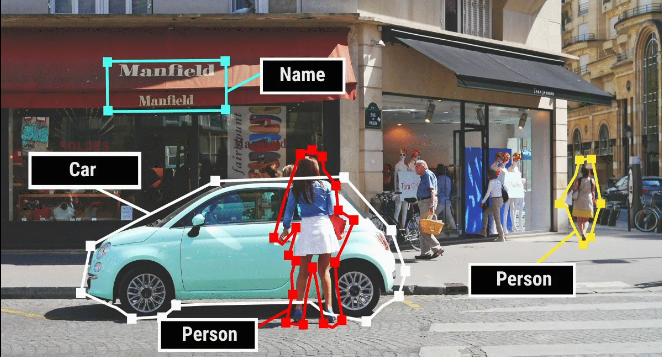
O uso de labeled data demonstra que um algoritmo de machine learning requer inputs iniciais fornecidos por seres humanos, para que o modelo possa diferenciar as características específicas entre objetos. Com o tempo a máquina aprenderá as diferenças com um grau de confiança tal que poderá caminhar com as próprias pernas.
Já deep learning é um subconjunto de machine learning, atualmente empregado na criação de carros que se dirigem sozinhos, por exemplo. Enquanto o uso de machine learning visa treinar uma inteligência artificial através de dados e algoritmos, no deep learning o que se busca é imitar o comportamento do cérebro humano. Nosso cérebro possui cerca de 86 bilhões de neurônios interligados, transmitindo sinais químicos, elétricos e informações a todo momento. O deep learning utiliza uma rede neural artificial para selecionar características distintas entre os objetos sem intervenção humana, utilizando o mesmo processo que os neurônios do nosso cérebro.
Uma certa informação sobre um objeto é capturada por uma primeira camada da rede neural e repassada às camadas subsequentes, gerando várias interações. O processo se repete e se ajusta, treinando a rede neural que, se baseando apenas em dados não estruturados, não precisa de intervenção humana para caracterizar objetos. Quanto mais interações, mais eficiente se torna o modelo: ao observar padrões de repetição, o deep learning agrupa os dados e descobre padrões ocultos, através de aprendizagem não supervisionada.
Mas reproduzir o comportamento do nosso cérebro requer uma enorme quantidade de dados para treinar a máquina: assim, a alta precisão de um modelo de deep learning é rivalizada com o grande tempo de espera necessário para processar os dados, tornando a técnica de machine learning mais indicada quando hardware mais poderoso não estiver disponível, por ser menos complexa e dispendiosa em termos de recursos.
Week 14, 2023
✱ Tetris has been gravitating around me all week now. With the Tetris movie released on Apple TV on March 29, all I’ve been wanting to do is to watch it. Unfortunately, I haven’t been able to grant myself this desire so far, due to a couple of setbacks. Luckily for me, I’ve been enjoying playing Tetris meanwhile: Techmino and Falling Lightblocks on my phone, and Tetris Effect: Connected, on Steam, have sucked away a nice amount of hours from my life. The latter has even made the Tetris theme, in a new rearranged, remixed version, stick to my mind like an earworm. Hopefully, I’ll watch the movie soon… -ish.
✱ I’ll be attending Web Summit Rio, from May 2nd to 4th, and that came as a complete, unexpected surprise! Web Summit Rio will be the first of its kind in Brazil, the largest tech event of the country, comparable to Web Summit Lisbon, Collision in Toronto and RISE in Hong Kong. The surprise aspect happened when, besides learning my employer will be taking part in it for the first time, I took part on a draw among my work mates and was awarded a ti jet to the event, the opportunity to be present there. I’ve always heard about this event and now my expectations are set and high.
✱ I’m back to WordPress after sometime away from the tool. I used to keep my site running on it, and started blogging with it right in its beginning, 2003. I wrote many posts and years later decided to backup everything and pull the plug on it. After a writing hiatus, I settled with many different tools at the same time. There’s Write.as, Bear Blog and omg.lol, this last one the newest addition to my blogging stack. All of them are excellent tools, but all of a sudden I missed Wordpress and decided for a comeback. Expect my content to be concentrated here, from now on.
✱ Easter is on us again, and this means we’ve gone shopping for… chocolate 🍫. I don’t know if the custom of eating chocolate eggs is a global thing, but in Brazil Easter eggs are popular, yet not affordable as of the latest years. At home it’s already a practice to make up for the eggs with chocolate bars and assorted candy. And we’re all set for tomorrow here. Stocks filled to appeal to me, my wife and kids.
✱ Tetris has been gravitating around me all week now. With the Tetris movie released on Apple TV on March 29, all I’ve been wanting to do is to watch it. Unfortunately, I haven’t been able to grant myself this desire so far, due to a couple of setbacks. Luckily for me, I’ve been enjoying playing Tetris meanwhile: Techmino and Falling Lightblocks on my phone, and Tetris Effect: Connected, on Steam, have sucked away a nice amount of hours from my life. The latter has even made the Tetris theme, in a new rearranged, remixed version, stick to my mind like an earworm. Hopefully, I’ll watch the movie soon… -ish.
✱ I’ll be attending Web Summit Rio, from May 2nd to 4th, and that came as a complete, unexpected surprise! Web Summit Rio will be the first of its kind in Brazil, the largest tech event of the country, comparable to Web Summit Lisbon, Collision in Toronto and RISE in Hong Kong. The surprise aspect happened when, besides learning my employer will be taking part in it for the first time, I took part on a draw among my work mates and was awarded a ti jet to the event, the opportunity to be present there. I’ve always heard about this event and now my expectations are set and high.
✱ I’m back to WordPress after sometime away from the tool. I used to keep my site running on it, and started blogging with it right in its beginning, 2003. I wrote many posts and years later decided to backup everything and pull the plug on it. After a writing hiatus, I settled with many different tools at the same time. There’s Write.as, Bear Blog and omg.lol, this last one the newest addition to my blogging stack. All of them are excellent tools, but all of a sudden I missed Wordpress and decided for a comeback. Expect my content to be concentrated here, from now on.
✱ Easter is on us again, and this means we’ve gone shopping for… chocolate 🍫. I don’t know if the custom of eating chocolate eggs is a global thing, but in Brazil Easter eggs are popular, yet not affordable as of the latest years. At home it’s already a practice to make up for the eggs with chocolate bars and assorted candy. And we’re all set for tomorrow here. Stocks filled to appeal to me, my wife and kids.
Week 13, 2023
✱ This week work got me very busy. I had almost no time to do anything else; thus, my reading of “The Poppy Wars” has almost stopped — I guess I must have progressed a bare 5% or 6%, and my series episode watching actually stopped. On the one hand, this must have been the week I felt most tired ever in 2023. On the other hand, I feel I’m learning new things and making some progress, what feels very nice.
✱ Have you ever felt so tired, but so really tired that if you could, all you’d do would be to sleep all day long? Along with this week’s work I started to feel very much tired by the end of each day, specially last Thursday and yesterday, Friday. These were the days I needed to attend work in person — taking me out of my WFH routine. Now. One thing is to consider that having to ride to work and stay there, coming back home by the end of the day is the likely culprit for all this tiredness. I can’t actually rule it out, but I started to worry, because I’ve been feeling very sleepy — and kind of energy-less — as of lately. I’m considering setting an appointment to go see a doctor. I have some medical conditions under control, which I’m not going to list here for privacy purposes, but I guess any time feels good for a visit to the doctor for a checkup.
✱ Another side effect I felt this week was a raise in my pile of to read articles. Between my own savings from web and the newsletters I follow, there’s so much unread material that I’m seriously considering ditching it all — i.e., marking every piece as read and moving on. No FOMO here. For what I do get to read, I usually take notes, make highlights and comments. I’m considering starting to publish them in this blog soon enough.